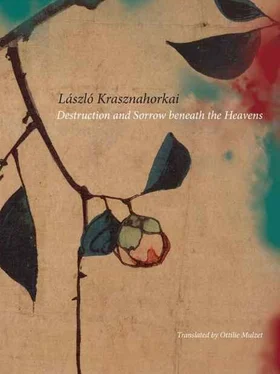Do you perform exclusively old pieces here?
lai. We perform new pieces too. In a new piece, there is no longer any meaning to the make-up. You know, comrade, the conceptual abilities, aesthetic sensibilities and intellectual capacities of the people today are much more advanced. Because our predecessors lived somewhere among the mountains or in a river valley. And they never left, they never travelled, so they never knew the outside world. Things are no longer like that. People travel. The public is very well acquainted with the outside world, so their faculties of discernment are on a much higher level. So that theatre will also be different, will demand something different now. Only one thing cannot change — kunqu. I understand that theatrical performance has to change with the modern world, because people have changed, but there is one very important thing which I would like to emphasize — kunqu cannot change. It cannot become jingju[95] — the Peking Opera. Kunqu originates from Kunshan, kunqu is Kunshan opera, it cannot be anything else. Because then it will no longer be kunqu. That is my opinion.
Lai fills the cups with tea, nodding, hemming and hawing, then nodding, hemming and hawing again, then he clears his throat and looks deeply into Stein’s eyes.
lai. All of Chinese culture is facing tremendous challenges. I am in charge of this theatre, but I could also say that I am just a lighting technician at the Kunqu Company of Zhejiang Province. However, I do have an opinion, because I think about these things. And I see that it is not only traditional culture that is endangered. I believe that we do not even know now what kind of role culture can play in people’s lives. We do not know, no one knows. And there is a great need for this problem to be solved.
We here, and maybe you too, in Europe — maybe everywhere in the world — are living through a very difficult time of economic development. And this era of economic development, in my opinion, presents the gravest of problems for national culture. What happened in Japan after the Second World War? Kabuki went through a very sad epoch, as well as noh. Later on, standards of living improved in Japan and the sense of responsibility towards their national culture arose in them. So there is hope that this will happen with us as well. Right now, it is truly difficult. Today, we do not know how to grant status to culture. For kunqu, this is the most difficult of times. You know, Comrade László, I do not say that there is no hope. Culture in Japan has thrived, and now a ticket for a performance of kabuki or noh is very expensive. A kabuki piece can run for weeks and months. That could happen here as well. But we must be aware of one thing — kunqu will never be a theatre for the masses. Kunqu was always for the few, for the erudite. Now, and perhaps never again, can we wish for young people to come flooding into the kunqu theatre. They envisage entertainment as something and someplace else. This is fine, we cannot deny them this. But we can expect one thing from them — not to deny the culture of their ancestors. At least a few of them.
Stein now asks about his personal life. Mr Lai is silent for a long time; he turns his cigarette around in his hand.
lai. I originally did not study to be a kunqu actor. Before 1979, I was a part of the Zhejiang Song and Dance Ensemble. I wanted to be a dancer. I studied dance, and my wife studied kunqu at the provincial art college. And in Zhejiang I was very lucky — at that time, they taught dance according to the traditions of the Russian ballet school. They also placed great emphasis on a complex training, so I had to learn kunqu too. So I learnt traditional singing, traditional music, even anatomy. My wife and I had the same master. How did this work? A person had to observe the master, observe the pieces, then imitate the master until, without any instruction, in the recognition of his own personality and among the givens of his own cultivation, he could somehow, step by step, understand the figure that had to be created. This is the decisive thing — the comprehension of the figure to be portrayed; the rest is theatrical performance and so on. It helps only partially. What that figure — which a person will create across an entire life — will be like depends on many things. First, it depends on his age, his talent, his education, his sensitivity and other accidental factors. And an actor, in kunqu, does not simply play a man. As you perhaps know from jingju, from the Peking Opera, there are differing male roles. For us as well there is the xiaosheng, the young man; there is the laosheng, the old man; there is the man with a painted face, the da hualian; the clown, the xiaochou; as well as the wusheng, the warrior. During basic training it doesn’t matter what kind of role you are playing or will play, you must learn the most important theatrical abilities. You must learn the theatrical steps, the practice of the ‘bent shoulder’, the lowering of the long silk sleeve, the basic modes of singing. Everyone learns these. Then if, let us say, you will be a wusheng, from that point on you will complete the training necessary for that set of roles, or if you will be a xiaosheng, you train for that. So we say that the wusheng follows the wusheng master, and the xiaosheng follows the xiaosheng master. And it is always the given master who decides if you are suitable for this group of roles. He picks out his students.
Should it really be imagined as such, that there is really nothing: Neither book, no description, nor secret handbook, nothing at all, just the master?
lai. The student learns from the master. Naturally, certain pieces have to have their own texts. There are role books as well. And each kunqu drama text contains, of course, dramatic instructions. It looks something like the texts for the noh pieces in Japan. Where, for example, a single book contains the score and the text. In the old days, this was known as the gongchi[96] score.
They have been sitting for more than two hours in this shabby office, listening to this bitter, cheerful person. They make their excuses and, slowly, their farewells, but as Lai leads them out of the office he offers to show them the theatre. He has two rooms at his disposal, which in Europe would serve as a rehearsal room for a studio theatre: at the front is a stage of a few square metres, a spectators’ area also of a few square metres by the entrance, for five rows of chairs, and in between certain empty places, the function of which is unclear. Lai jokingly shows them everything they have, it is not too much, he says, still, there’s plenty of room for the public, he winks at his visitors with his own bitter serenity, then stops before the pictures on the wall in the miserable, half-lit, chilly corridor, points at them and recites the names of each famous kunqu actor, and finally accompanies them to the front door. They do not leave immediately because they would like to know something.
Mr Lai — Stein leans in close to him — would you permit a confidential question? So much has been said about kunqu, but what does kunqu mean to you, personally? He has been truly moved, Stein says, by what he has heard and what he has seen of the theatre but he has also grown rather sad. Mr Lai — Stein gestures, to the outside. There are so many rich people in the city. . You could do so many things to make a lot of money. . You sit here in this office, you take care of the affairs of this poor kunqu theatre, and in the evenings, if there is a performance, you do the lighting. Tell me, why?
lai. I am a kunqu actor. And I am not completely alone. That is, I speak in the name of those with whom I can say that this is the Kunqu Company of Zhejiang Province. Of course there aren’t too many of us, but all of us work for kunqu. And if I say that I am proud of our culture, proud of classical literature, music, painting and of course theatre, then that is true as well. But I believe there is something else. I love kunqu. I love classical culture. And I love China. So what does it matter if I am poor, that I will never have even a penny to my name?
Читать дальше












